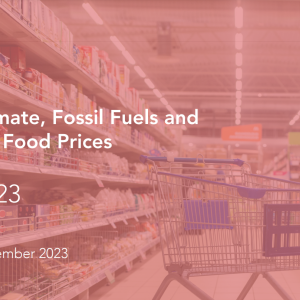
This report explores the relationship between food price inflation, energy prices and climate driven extreme weather events. The authors find that year-on-year extreme weather is exacerbating food price inflation, offsetting the dampening effect of falling energy prices in 2023 in the UK.
Summary
Energy and fertiliser prices are significant drivers of global food price inflation and the war in Ukraine has created a spike in energy and fertiliser costs due to disruption to the fossil fuel industry. However, lower energy costs in the last year have contributed to world agricultural prices falling from the record peaks that were experienced in 2022. Nevertheless, both world agricultural and food prices remain at high levels and exceed prices experienced during the global food crises of 2007-08 and 2011. Simultaneously global temperatures are rising year on year and bring widespread droughts, wildfires, floods and other extreme weather events. This is driving research to identify the connections between climate change, extreme weather, energy and macroeconomic effects. The authors highlight the following findings: .
- Cashin et al. (2017) find that extreme weather patterns have a significant impact on global agricultural prices not just via the direct disturbances to global production but also because the impact of extreme weather on energy markets increases costs for food production more generally.
- Faccia et al. (2021) distinguish between food inflation, non-food inflation and consumer price indices more generally. Their analysis shows that extreme temperatures affect consumer inflation more generally but the main route relating to this impact is via food (rather than non-food) prices, with particularly strong effects in emerging economies.
- Peersman (2022) focuses on two pathways linking weather events to the macro-economy. First, anomalous weather patterns result in a supply shock to global agriculture which results in food inflation across all Eurozone countries. But the consequence of these direct weather-related events is that the food inflation impact drives up the demand for higher wages which therefore contributes to higher levels of headline inflation.
- Kotz et al. (2022) results confirm the importance of the extreme temperature-food inflation channel for price stability. They also explore the impact of future warming scenarios on price stability: the impact of increasing temperatures on price stability is predicted to increase significantly with particularly strong effects arising from the food inflation channel
Food price inflation continues to be a major concern for global policy makers, particularly so in the UK where food price inflation peaked at ~20% in March 2023, the highest rate in half a century. The recent decline in the rate of UK food inflation has occurred against the background of the ‘perfect storm’ of high global agricultural and energy prices arising due to Russia’s invasion of Ukraine coupled with extreme weather events that gave rise to UK food inflation in 2022 close to 11%. This year, the effect of energy as a driver of UK food inflation has reversed while the effect of extreme weather has increased. Falling energy prices depressed inflation by 2.6% whilst extreme weather added 5.2% to food inflation, resulting in a 2.7% rise, equivalent to £97 increase in household food budget. In sum, the effects of climate change have been partially offset by reduction in energy cost, but global temperatures in 2023 exceeded previous records leading to the dominant impact of climate change. Results show that food bills are estimated to be £605 higher in real terms than they were in 2001 as a result of the effects of climate change and energy costs. Of this additional burden, £361 (60%) is due to the effect of climate change and £244 (40%) is due to higher energy bills.
Food inflation is global in its nature and other countries also face significant challenges. Food inflation in Turkey is over 50%, in Egypt over 60%; Argentina over 100%; and in Venezuela, food inflation exceeds 400%. Food prices are of particular concern to policy makers because they are regressive; having the greatest impact on the poorest and most vulnerable. Food price change is the major driver of food insecurity, as well as a determinant underpinning workers’ expectations in wage bargaining and through it, general future inflation. In many countries, food prices behave very differently from prices in the rest of the economy, giving rise to concerns about how food inflation may affect price stability more generally in the future.
References
Lloyd, T. (2023). ‘Climate, Fossil Fuels and UK Food Prices’, The Energy & Climate Intelligence Unit, November 2023
Find the report here







Post a new comment »